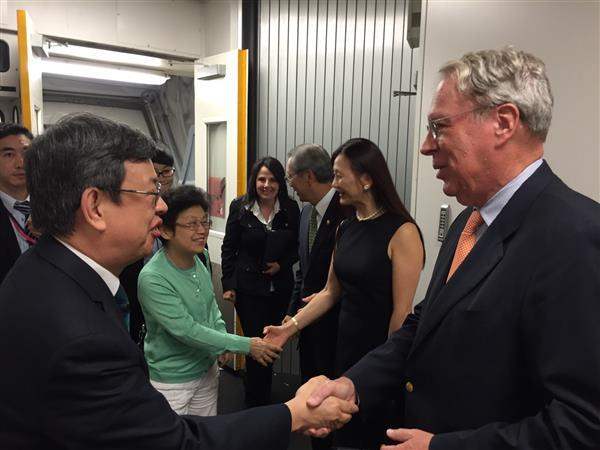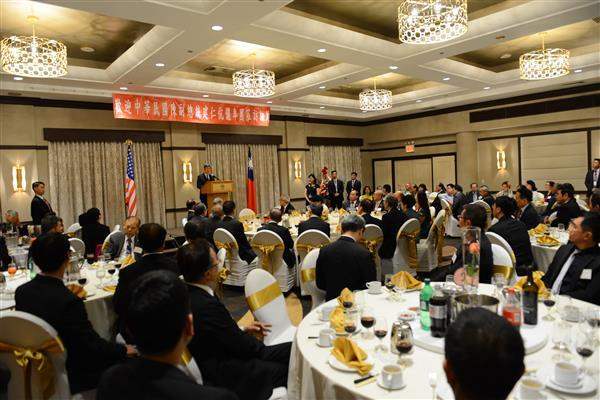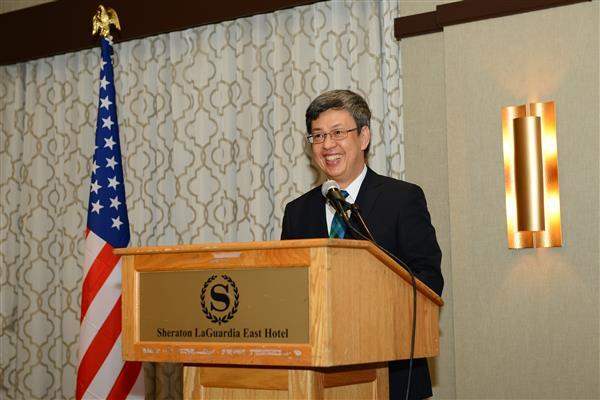News & activities
 News releases
News releases
2016-08-19
Vice President Chen attends expatriate banquet in New York City
Vice President Chen Chien-jen attended a dinner banquet at 7:30 p.m. on August 18 local time (7:30 a.m. on August 19, Taipei time) with leaders from the Greater New York expatriate community, who gave the vice president and his delegation a rousing reception.
In remarks, the vice president began by conveying greetings to the assembled expatriates from President Tsai Ing-wen. He then said how very happy he was to meet with friends from home in the Greater New York area before returning to Taipei. He also expressed his gratitude to all of the expatriates who, when he transited through New York back on August 13, so graciously came to the airport late at night to welcome him.
The vice president pointed out that New York is a world capital, and a global center of finance, media, culture, performing arts, and fashion trends. The Greater New York area is also home to many expatriates, and has the largest Chinatown in the US.
Reflecting on his personal relationship with New York, the vice president said that the time he spent in the city doing academic research on public health issues was an important chapter in his life. Conducting research in public health, environmental health, and molecular epidemiology as a research fellow at Columbia University in 1989-1990, the vice president got to know many outstanding practitioners in the field of public health, and set a solid foundation for his professional research.
The vice president feels that improvements in public health practices are closely tied to progress in human civilization. So over the years, Taiwan's accomplishments in the field of public health have not only improved living conditions, raised the overall quality of our people, and facilitated rapid economic growth, but have also expanded our middle class, and made them a force for social stability. Those contributions have thus had far-reaching impact on the development of freedom, democracy, rule of law, and human rights in Taiwan.
The vice president also noted that in the wake of economic development and improvements in public health, Taiwan has also provided other developing countries with medical cooperation programs and humanitarian aid. This has transformed us from a country that received aid to one that now provides aid, making Taiwan a contributor to the world at large. Many countries in the regions where Taiwan provides aid are our diplomatic allies. The Dominican Republic, which the delegation visited this time, is one of them. As President Tsai has said, Taiwan should put "steadfast diplomacy" into practice and engage in mutually beneficial external relations.
The vice president then expressed gratitude to the expatriate community of Greater New York for their care and support for Taiwan, and praised expatriate groups for their altruism in providing charitable foreign aid. Expatriate groups from the Greater New York area have not only visited countries in the Caribbean like the Dominican Republic, but have also left their mark further afield in Asia and Africa. In addition to acknowledging the New York expatriate community for showing wisdom, compassion, and the spirit of empathy, the vice president thanked everyone on behalf of the government for using compassion and kindness to spread Taiwan's soft power around the globe, and becoming a powerful asset to the ROC's diplomatic efforts.
The vice president also stated that because both the Democratic and Republican nominees in this year's US presidential race have deep roots in New York, this election has special significance for the city. In terms of democracy, the US is an old hand and Taiwan is a relative newcomer, which makes it all the more commendable that we have already elected a woman president. Taiwan's democratic accomplishments can thus be an inspiration for social development in ethnic Chinese communities. We should all cherish this hard-won fruit of democracy.
The vice president emphasized that since taking office, the new administration has been working hard every day, carefully and conscientiously, for the benefit of all Taiwanese and to find a viable future for the country. The government is also undertaking reforms to advance freedom, democracy, the rule of law, justice and human rights. The vice president then expressed hope that the expatriate community will support the current administration's reforms, and help keep the government on track.
Also attending the expatriate banquet were American Institute in Taiwan (AIT) Chairman Raymond F. Burghardt, National Security Council Deputy Secretary-General Tseng Hou-jen (曾厚仁), Deputy Minister of Foreign Affairs Javier Ching-shan Hou (侯清山), ROC Representative to the US Stanley Kao (高碩泰) and Mrs. Kao, Taipei Economic and Cultural Office in New York Director-General Lily L. W. Hsu (徐儷文), and expatriate leaders from the Greater New York area including Chinese Consolidated Benevolent Association of New York President Jerry Shiao (蕭貴源), Founding President of the World Taiwanese Chambers of Commerce Tsai Jentai (蔡仁泰), and New York Taiwan Center Founding President Chen Lung-Fong (陳隆豐).
In remarks, the vice president began by conveying greetings to the assembled expatriates from President Tsai Ing-wen. He then said how very happy he was to meet with friends from home in the Greater New York area before returning to Taipei. He also expressed his gratitude to all of the expatriates who, when he transited through New York back on August 13, so graciously came to the airport late at night to welcome him.
The vice president pointed out that New York is a world capital, and a global center of finance, media, culture, performing arts, and fashion trends. The Greater New York area is also home to many expatriates, and has the largest Chinatown in the US.
Reflecting on his personal relationship with New York, the vice president said that the time he spent in the city doing academic research on public health issues was an important chapter in his life. Conducting research in public health, environmental health, and molecular epidemiology as a research fellow at Columbia University in 1989-1990, the vice president got to know many outstanding practitioners in the field of public health, and set a solid foundation for his professional research.
The vice president feels that improvements in public health practices are closely tied to progress in human civilization. So over the years, Taiwan's accomplishments in the field of public health have not only improved living conditions, raised the overall quality of our people, and facilitated rapid economic growth, but have also expanded our middle class, and made them a force for social stability. Those contributions have thus had far-reaching impact on the development of freedom, democracy, rule of law, and human rights in Taiwan.
The vice president also noted that in the wake of economic development and improvements in public health, Taiwan has also provided other developing countries with medical cooperation programs and humanitarian aid. This has transformed us from a country that received aid to one that now provides aid, making Taiwan a contributor to the world at large. Many countries in the regions where Taiwan provides aid are our diplomatic allies. The Dominican Republic, which the delegation visited this time, is one of them. As President Tsai has said, Taiwan should put "steadfast diplomacy" into practice and engage in mutually beneficial external relations.
The vice president then expressed gratitude to the expatriate community of Greater New York for their care and support for Taiwan, and praised expatriate groups for their altruism in providing charitable foreign aid. Expatriate groups from the Greater New York area have not only visited countries in the Caribbean like the Dominican Republic, but have also left their mark further afield in Asia and Africa. In addition to acknowledging the New York expatriate community for showing wisdom, compassion, and the spirit of empathy, the vice president thanked everyone on behalf of the government for using compassion and kindness to spread Taiwan's soft power around the globe, and becoming a powerful asset to the ROC's diplomatic efforts.
The vice president also stated that because both the Democratic and Republican nominees in this year's US presidential race have deep roots in New York, this election has special significance for the city. In terms of democracy, the US is an old hand and Taiwan is a relative newcomer, which makes it all the more commendable that we have already elected a woman president. Taiwan's democratic accomplishments can thus be an inspiration for social development in ethnic Chinese communities. We should all cherish this hard-won fruit of democracy.
The vice president emphasized that since taking office, the new administration has been working hard every day, carefully and conscientiously, for the benefit of all Taiwanese and to find a viable future for the country. The government is also undertaking reforms to advance freedom, democracy, the rule of law, justice and human rights. The vice president then expressed hope that the expatriate community will support the current administration's reforms, and help keep the government on track.
Also attending the expatriate banquet were American Institute in Taiwan (AIT) Chairman Raymond F. Burghardt, National Security Council Deputy Secretary-General Tseng Hou-jen (曾厚仁), Deputy Minister of Foreign Affairs Javier Ching-shan Hou (侯清山), ROC Representative to the US Stanley Kao (高碩泰) and Mrs. Kao, Taipei Economic and Cultural Office in New York Director-General Lily L. W. Hsu (徐儷文), and expatriate leaders from the Greater New York area including Chinese Consolidated Benevolent Association of New York President Jerry Shiao (蕭貴源), Founding President of the World Taiwanese Chambers of Commerce Tsai Jentai (蔡仁泰), and New York Taiwan Center Founding President Chen Lung-Fong (陳隆豐).
Related News

2026-01-20
President Lai confers decoration on former Czech Parliament Chamber of Deputies Speaker Markéta Pekarová Adamová
On the afternoon of January 20, President Lai Ching-te conferred the Order of Brilliant Star with Special Grand Cordon upon Markéta P...

2026-01-15
President Lai meets Japan’s former Chief Cabinet Secretary Kato Katsunobu
On the afternoon of January 15, President Lai Ching-te met with a delegation led by Member of the Japanese House of Representatives and form...

2026-01-14
President Lai meets Phoenix Mayor Kate Gallego
On the afternoon of January 14, President Lai Ching-te met with a delegation led by Mayor of the City of Phoenix, Arizona Kate Gallego. In r...

2026-01-13
President Lai meets Canadian parliamentary delegation
On the afternoon of January 13, President Lai Ching-te met with a Canadian parliamentary delegation. In remarks, President Lai thanked the C...

2026-01-06
President Lai meets delegation from European Parliament
On the morning of January 6, President Lai Ching-te met with a delegation from the European Parliament. In remarks, President Lai said that ...






